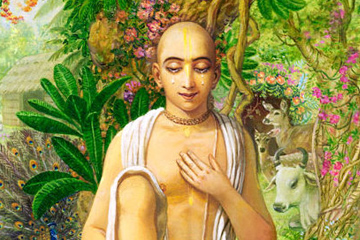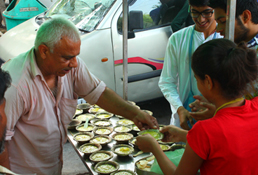Sri Sanatana, Sri Rupa and Sri Vallabha were three brothers, all employed in the service of the Badsa Hussain Shah. Amongst the three, there was only one descendent, Sri Jiva. Having been rewarded richly by the Badsa for their sevices, their household life was very opulent.
There was nothing lacking in whatever was necessary for the upbringing of the only son. The house was illuminated by the effulgence of the child’s golden complexion; his eyes were like the expanded petals of the lotus; every part of his body was graced with a lusterous, radiant splendor. When Sri Gaurasundara came to Ramakeli, Sri Jiva was blessed by having darshana of His worshipable lord, though he was just a baby at the time. Placing the dust of His lotus feet on the child’s head, Mahaprabhu indicated him to be the future sovereign preceptor of the Gaudiya sampradaya. Though he was only a child, Sri Jiva kept the form of the Lord, which fascinates all the world, within his heart. As he grew up, while eating, lying down, in his dreams, while he was awake, at all times, he would meditate on that form.
Later on, when his father and uncles renounced their family life in order to be with Mahaprabhu, the only child, Sri Jiva, was left with his mother in the family palace at Fateyabad. Lying in her lap, which was wet with tears of separation, he gradually began to grow as the waxing moon. Seeing that the mother and the child’s face were always wet with tears, their friends also fell under the shadow of sadness and only with great difficulty managed to assuage their grief. Whenever Sri Jiva would remember his father and uncles, or the lotus feet of Sri Gaura Hari, he would lose consiousness and fall to the ground.
As he got a little older, Sri Jiva took up the worship of the Deities of Sri-Sri Rama-Krsna. He would carefully decorate Them and offer bhoga and arati, serving Them with his full attention. Even in his play, whatever games he played were connected with Sri krsna’s pastimes.
While studying under the local panditas he became proficent in grammar, poetry and rhetoric. Noting his great intellect, his teachers commented, “Such brilliance is not often found in a child so young as this. No doubt he will be a very high-souled, saintly person.”
Even while engaged in his studies Jiva always thought of Sri Sri Nitai-Gauranga. Once he saw in a dream that Sri Rama-Krsna had taken the forms of Nitai-Gauranga and were dancing. [B.R.1.732] Giving him the dust of Their lotus feet, the Two Lords then disappeared. Having seen such a wonderful dream, Sri Jiva was consoled somewhat. Then he began to think, “When will I be able to crawl out of this well of family life and devote my full time and energy, my very self, to serving these two most magnanimous Lords?” But he was the only son of the family. Only in his company could his mother forget somewhat the pangs of separation in her heart. When Sri Jiva learned that his father had given up his life on the banks of the Ganga, he was compeletely unsettled. After that his eyes were never dry. The family members and friends tried to console him but to little avail. Family life had become the source of his utter sadness.
Someone suggested to Jiva to go to Navadwipa and bathe himself in the coolness emanating from the lotus feet of Lord Nityananda Prabhu so that his mind and body, burning with with grief, could be refreshed. Thus Sri Jiva set our for Navadwipa with a group of pilgrims. [B.R.1/741]
Nityananda Prabhu, the omniscient Lord, could understand that Sri Jiva was on his way to Navadwipa. Therefore He also left for there from Khardaha. After a few days, Jiva arrived at Navadwipa. Seeing the beauty of that place he was charmed. Falling down on the ground, he offered his dandavats to Mother Ganges. Inquiring from the villagers the directions to Mayapura, he learned that Nityananda Prabhu was residing at Srivasa Pandita’s house. At last arriving there, he fell down at the door to offer his dandavats. Nityananda Prabhu came out with Srivasa Pandita and picked him up and embraced him, asking, “Are you the nephew of Sri Rupa and Sri Sanatana?”
As an answer, Jiva again fell down on the ground at the lotus feet of Nityananda Prabhu. This time Nityananda Prabhu brought him in the house and began to inquire after the welfare of his family at Fateyabad. Then Sri Jiva was introduced to the devotees present in Navadwipa; he offered his salutations at their lotusfeet. Everyone was very happy to meet the nephew of Sri Rupa and Sanatana. That day Sri Jiva received the remnants of Nityananda prabhu’s prasadam.
The next day, the two of them came to Saci Mata’a house. Seeing the birthplace of Sri Gaurasundara, which was filled with such splendor, Sri Jiva was greatly pacified and fell down on the ground to roll in the dust. In the large courtyard the devotees were singing songs praising the glories of Sri Krsna Caitanya Mahaprabhu. Seeing Nityananda Prabhu, everyone stood up and then fell down, offering their dandavats at His lotus feet. Then Jiva saw Saci Mata sitting on the veranda.
Dressed in white with silk chadder around her shoulders she looked radiant, the white of her hair blending with her white sari. Though her body trembled with old age and was very thin, still the courtyard was illuminated by her divine effulgence. Forgetting herself in rememberance of Sri Gaursundara, she was sitting with her eyes closed. Becoming aware that Nityananda Prabhu had arrived, she covered her head with her sari and called her servant. “Isana! Srpada has arrived. Please wash His feet.”
After this was done, Nityananda offered namaskar to the mother of the Supreme Lord and took His seat. He then introduced Sri Jiva to her. Saci Mata placed her hand on his head to bless him, and Sri Jiva floated in the ocean of happiness. Saci Mata then requested the two of them to honor the Lord’s prasada. “Take prasada here at your mother’s house today, my child. I offered there preparations in secret to Sri Gaurcandra.”
Sri Jiva spent some days with Nityananda Prabhu, touring the nine islands of Navadwipa, in order to have darsana of the holy places of the Lord’s pastimes there. Then, as ordered by Nityananda Prabhu, he set out for Kasi (Varanasi) . At Kasi he studied Vedanta under Sri Madhusudana Vacaspati, a disciple of Sarvabhauma Bhattacarya. The conclusions of Vedanta contained in Srimad-Bhagavatam that were expounded by Sri Caitanya Mahaprabhu to Sarvabhauma Bhattacarya in Puri had been in turn taught by the Bhattacarya to Madhusudana Vacaspati, who established a toll at Kasi. From him, Sri Jiva mastered the same conclusions.
From here Sri Jiva set out for Sri Vrindavana where he received shelter at the lotus feet of his two uncles. Sri Rupa and Sanatana. They were very pleased to see him and received from him all the news. Jiva stayed with Sri Rupa, who began to teach him Srimad Bhagavatam. After initiating him with the divine mantra, Rupa engaged him in the service of Sri Sri Radha-Damodara. According to Sadhana dipika, this Deity of Damodara was fashioned by Rupa Gosvami’s own hand for his dear disciple Sri Jiva. Sri Sri Radha-Damodara are presently being worshipped in Jaipur, Rajasthan.
Seeing that Jiva had quickly become conversant with the conclusion of the Srimad Bhagavatam, Sri Rupa engaged him in proof-reading his Bhakti-rasamrta-sindhu. At this time Sri Jiva compiled a commentary on Bhakti-rasamrta-sindhu called Durgama sangamani. In the year 1476 (Sakabda) Sri Sanatana Gosvami compiled Sri Vaisnava tosani, a commentary on the tenth canto of Srimad-Bhagavatam, which he gave to Sri Jiva for proof reading. Under the order of Sri Sanatana, Sri Jiva compiled a commentary on that named Laghu Vaisnava tosani in the year 1500 (Sakabda). His writings, along with those of Sri Rupa and Sri Sanatana, Sri Gopal Bhatta, Sri Raghunatha Bhatta, Sri Raghunath das, Sri Krsna das, Sri Kasisvar Pandit, and Sri Madhu Pandit, completely captivated the learned men of that time. It was the beginning of a golden age at Sri Vraja dhama.
Sri Jiva regurlarly brought water for Sri Rupa and Sanatana’s bath. He massaged their heads with oil, cleaned their ashram, worship the Deity, cooked and corrected manuscripts.
After the disappearance of Sri Rupa and Sanatana, Sri Jiva continued the tradition that they had inaugerated. Once Sri Jiva travelled to Agra to debate with the Rajputs concerning the glories of Jamuna and Ganga rivers. He established that the Jamuna is more glorious than the Ganga as the Ganga emanates from Krsna’s lotus feet whereas the Jamuna is His own consort. At this the Moghul emperor was very much satisfied and wanted to present him something. Sri Jiva replied that he would accept some blank papers. So the emperor presented Jiva some stained paper. (At that time paper was very rare and most manuscripts were usually composed on leaves.)
There is also a legend that once, when a moghul emperor (possibly Akbar) wanted to confer something on the Goswamis of Vrindavana, they requested a farman (emperor’s order) that no living beings would be killed within Vraja. As a result of this no king would come to hunt there anymore.
The disciple of Lokanatha Gosvami, Narottama dasa Thakura Mahasaya, Sri Gopala Bhatta Gosvami’s disciple Srinivasa Acarya Prabhu, and the disciple of Hrdaya Caitanya Prabhu, Sri Syamananda Prabhu, were greatly favored by Srila Jiva Goswami. Under his tutelage they studied all the literatures of the Gosvamis. Later he sent them to preach this knowledge in Bengal.
Srila Jiva Gosvami composed many literatures, amongst them:
Harinamamrta-vyakarana
Sutra-malika
Rasamrta-sesa
Gopala-virudavali
Sri-Madhava-mahotsava
Sri-Sankalpa-kalpavrksa
Brahma-Samhita-tika
Bhakti-rasamrta-sindhu-tika (Durgama-sangamani)
Ujjvala-nilamani-tika (Locana-rocani)
Gopala-campu
Sat-sandharbha (Tattva-sandarbha, Bhagavata-sandarbha, Paramatma sandarbha, Krsna-sandarbha, Bhakti-sandharbha, Priti-sandarbha)
Srimad-Bhagavata-tika (Krama-sandarbha)
Laghu-vaisnava-tosani (Tenth Canto Bhagavatam commentary)
Sarva-sambadina (commentary on Sat-sandarbha)
Gopala-tapani-tika (Sri-Suhkha-bodhini)
Padma-puranastha-yogasara-stotra-tika
Gayatri-vyakhya-vivrti (A commentary on the Gayatri mantra as described in the Agni Purana, chapters 216-217)
Radha-Krsnarcana-candrika
Dhatu-sangraha
Bhavartha-sucaka-campu
Birth: 1533 (Christian calendar), 1455 (Sakabdha), 12th day of the bright fortnight in the month of Bhadra.
Disappearance : 1540 (Sakabdha), 3rd day of bright fortnight, Pausa
Age: 85 years
Bhajans Composed by Sri Jiva Goswami
Audio Lectures about Sri Jiva Goswami
Read ebooks of Sri Jiva Goswami
Gallery of Sri Jiva Goswami
Biography of Sri Jiva Goswami
Biography of Sri Jiva Goswami
Read Blogs of Sri Jiva Goswami







